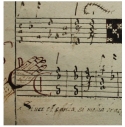Soloistic Instrumental Music in the Central European Cultural Region (ca. 1500 – ca. 1550): Instrumental Praxis and Humanistic Contexts

Soloistic Instrumental Music in the Central European Cultural Region (ca. 1500 – ca. 1550): Instrumental Praxis and Humanistic Contexts
FWF-Project V661 (Elise-Richter-Program)
Project duration: 2019–2024
PI: Dr. Kateryna Schöning
Website: www.tablatures-humanism.at
The research project answers the following questions: What was the function of lute music in the musical life in the first half of the 16th century? What did users of the time expect from tablatures? How were the tablatures "read"? Solo instrumental pieces and sketches from previously unresearched tablatures will first be analysed, transcribed and annotated. An attempt will be made to explain the history of solo instrumental music (lute) in its functional context on the basis of Central European sources. This task will also be solved in an interdisciplinary context, taking into account loci communes practice as a fundamental component of humanism in the 16th century. Student notebooks, notebooks for domestic use or textbooks - which were often tablatures - are rich in evidence of loci communes practice. It is therefore relevant to explore the transmission, compositional and improvisation techniques of this instrumental music in relation to loci communes practice. The results can radically change our analyses and perceptions of the repertoire. Finally, the tablatures will be analysed with regard to the change of media in the 16th century (manuscript - print) and their connection to the non-musical collections (libra amicorum or family registers).
The results of the study will be published in a monograph entitled 'Loci communes und Tabulaturen des 16. Jahrhunderts im deutschsprachigen Raum'. A database (still closed to the public) will be prepared with the material from the project.
